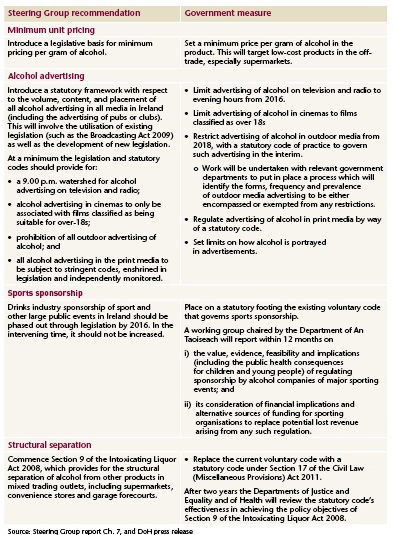Mongan, Deirdre (2014) Ministers announce details of proposed Public Health (Alcohol) Bill. Drugnet Ireland, Issue 48, Winter 2013, pp. 1-2.
| Preview | Title | Contact |
|---|---|---|
|
PDF (Drugnet Ireland 48)
- Published Version
1MB |
On 24 October 2013 Ministers James Reilly, Frances Fitzgerald and Alex White announced that the government had, at its cabinet meeting on 22 October, approved a number measures to be incorporated in a Public Health (Alcohol) Bill to deal with harmful use of alcohol.1 The measures are based on the Steering Group Report on a National Substance Misuse Strategy,2 which was published in February 2012 and contained 45 recommendations under the pillars of supply, prevention, treatment and rehabilitation, and research.
%20Bill%20-%20photo.jpg)
Minister of State Alex White, Minister for Health James Reilly, and Minister for Children and Youth Affairs Frances Fitzgerald announce measures to deal with alcohol misuse
The table below summarises the recommendations of the Steering Group that require a legislative change, and the corresponding government measures to be provided for in the proposed Bill in relation to minimum unit pricing, alcohol advertising, sports sponsorship, and structural separation of alcohol from other products in mixed trading outlets.

B Substances > Alcohol
MM-MO Crime and law > Substance use laws
MP-MR Policy, planning, economics, work and social services > Financial management > Sponsorship
MM-MO Crime and law > Substance use laws > Alcohol laws (liquor licensing)
G Health and disease > Substance use disorder > Alcohol use disorder
G Health and disease > Public health
L Social psychology and related concepts > Physical context, location or place > Alcohol beverage sales outlet (shop / pub / bar)
MP-MR Policy, planning, economics, work and social services > Marketing and public relations (advertising)
Repository Staff Only: item control page